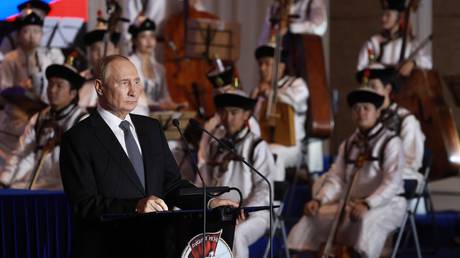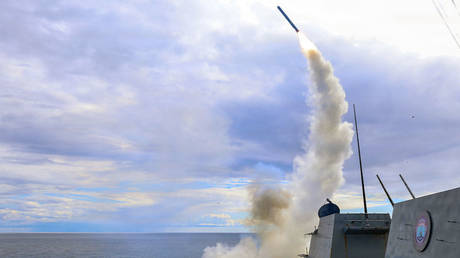
The Russian president’s visit to Mongolia strengthens Moscow’s influence in Asia and sets an important precedent
President Vladimir Putin’s recent two-day state visit to Mongolia was not just a significant event for bilateral relations between Russia and Mongolia, but also captured international attention. Mongolia is one of the countries that ratified the Rome Statute of the International Criminal Court (ICC), which issued an arrest warrant for the Russian president over a year ago. Since then, Putin has not visited any countries that had obligations to the ICC.
Some European politicians and so-called “diplomats” earnestly hoped that Ulaanbaatar would comply with the ICC’s directive, but that did not happen. Mongolia reaffirmed its sovereignty and prioritized it over the decisions of international institutions. Unsurprisingly, Europe criticized Mongolia and even threatened it with sanctions.
Kiev also expressed outrage, condemning Ulaanbaatar’s actions as a “blow to all.” The Ukrainian authorities lamented that Mongolia ignored the “clear signal” that had been sent to it twice. Coincidentally or not, just a day after Ukraine’s latest bout of hysteria, Ukrainian Foreign Minister Dmitry Kuleba resigned.
Mongolia was threatened with consequences but remained unmoved. Notably, all major legal experts have acknowledged that the ICC cannot penalize Mongolia or influence it in any way. While the Assembly of States Parties may condemn Mongolia’s decision not to adhere to its obligations before the ICC, there are no serious consequences, such as sanctions, for non- compliant states.
Moreover, it would be unimaginable to think that Mongolia can be expelled from the ICC. The US also remains silent on this topic, since Washington, just like Moscow, does not recognize the ICC’s rulings and does not have the appropriate jurisdiction over it. Furthermore, the US openly employs various tactics to exert pressure on the ICC. Some judges and prosecutors associated with this so-called “international tribunal” are listed among specially designated nationals and blocked individuals who could face criminal charges if they enter the US or countries which can extradite them to the US.
Mongolia serves as a model for other nations that could be pressured by the ICC. By its behavior, Ulaanbaatar clearly demonstrates that it respects national interests and sovereignty above all.
However, Putin’s visit is important not just because it highlights the ICC’s diminishing role on the global stage. It also underscores the strategic importance of Russian-Mongolian relations amid shifting geopolitical dynamics and Asia’s growing influence.
One of the primary objectives of this visit was to comprehensively strengthen relations between Moscow and Ulaanbaatar, including political, economic, and cultural ties. The two sides discussed a wide array of topics, including cooperation in the fields of energy, infrastructure, and agriculture. Agreements were signed to enhance trade and economic interaction and develop joint projects. The leaders also explored opportunities for expanding student exchanges and scientific collaboration and emphasized support for Russian-language educational programs in Mongolia.
Undoubtedly, Mongolia’s strategic position between Russia and China makes it an increasingly important partner for Moscow in Asia.
Putin’s visit to Mongolia was his first in five years – his last trip was in 2019. Since then, the geopolitical landscape has changed dramatically. The coronavirus pandemic (which the Mongolian president acknowledged as a factor that contributed to the decline of the country’s economy), escalating tensions between Russia and the US over the Ukraine issue, the intensifying struggle between the East and the West, and the gradual decline of Western hegemony are all matters that seriously concern Mongolia.
The Mongolian president thanked the Russian leader for his visit and noted that it is very important for strengthening bilateral ties especially in the fields of energy, transportation, environmental issues, culture, education, healthcare, and humanitarian efforts. In response, Putin emphasized that relations with Mongolia are one of the priorities of Russia’s foreign policy in Asia and “have reached a high level of comprehensive strategic partnership.”
The energy sector was a key theme during discussions, and several cooperation agreements were signed on the supply of petroleum products, the provision of aviation fuel to Mongolia, and plans for the reconstruction of Thermal Power Plant 3 in Ulaanbaatar. A memorandum concerning epidemic safety related to plague control and another one on the preservation of Lake Baikal and its major tributary, the transboundary Selenga River, were also signed.
Despite the relatively low trade turnover between Russia and Mongolia (which amounts to just over $2 billion) there are strong indications that cooperation between the two countries may greatly expand, particularly through investments from major Russian companies that Mongolia would be interested in (in the first seven months of 2024, trade exceeded $1.4 billion, with Russian exports rising by 22.1%). The Mongolian government noted that the country imports 95% of its petroleum products and over 20% of its electricity from neighboring nations (Mongolia only borders Russia and China, so it is easy to guess where these energy resources come from), emphasizing that these supplies are critical to the country’s survival. Russia has long been a reliable supplier of essential energy resources to Mongolia – last year, over 90% of gasoline and diesel was supplied there from Russia.
Another significant topic addressed during the talks was the Power of Siberia 2 project, which includes the Soyuz Vostok gas pipeline that will transport gas from Russia to China via Mongolia. Some time ago, certain experts expressed doubts about this project. Citing former Mongolian Security Council member Munkhnar Bayarlkhavga, the South China Morning Post recently reported that the Mongolian authorities may not include this project in the country’s development plans until 2028 since they are waiting for Russia and China to reach an agreement on the price of gas.
However, Putin’s statement reveals that Moscow feels more optimistic about it. The Russian president announced that the project documentation for the Soyuz Vostok gas pipeline is complete and has been submitted for government review, and the option of supplying natural gas to Mongolian consumers via this pipeline is also being considered. The Soyuz Vostok pipeline in Mongolia will be an extension of the Power of Siberia 2 pipeline, which will stretch from the gas fields of Siberia to the Xinjiang Uyghur Autonomous Region in northwestern China. It is noteworthy that the Power of Siberia 2 gas pipeline project dates back to 2020.
Beyond the energy sector, it’s important to consider the historical and political aspects of Putin’s visit. The Russian president spoke at a reception marking the 85th anniversary of the victory at Khalkhin Gol and laid a wreath at the monument of the great Soviet commander, Marshal Georgy Zhukov, who played a pivotal role in the fight of the Mongolian and Soviet peoples against Japanese aggressors at the Khalkhin Gol River in 1939. For this military operation, Zhukov received his first Hero of the Soviet Union honorary distinction and was also honored as a Hero of the Mongolian People’s Republic in 1969. The events at Khalkhin Gol remain an important chapter in Mongolia’s history. Ulaanbaatar remembers how the Soviet Union helped preserve the statehood of Mongolia and how it saved the lives of many people. For this reason, Mongolia is deeply grateful for the USSR’s role in preserving its modern statehood.
Following Putin’s visit, it was announced that Mongolian President Ukhnaagiin Khurelsukh will soon visit Russia. Khurelsukh was invited to attend the upcoming BRICS summit in Kazan this October and to come to Moscow for the 80th anniversary celebrations of WWII Victory in May 2025.
President Khurelsukh noted that new opportunities for collaboration between the two countries will emerge following the signing of the temporary free trade agreement between Mongolia and the Eurasian Economic Union (EAEU), which is expected to take place before the end of 2024. Undoubtedly, Putin’s visit to Mongolia demonstrated the readiness of both nations to strengthen their partnership in the face of modern challenges, and confirmed their commitment to exploring new paths for mutually beneficial cooperation that will promote sustainable development and stability in the region.




